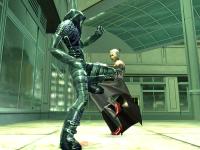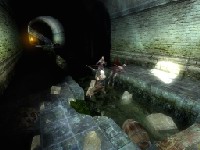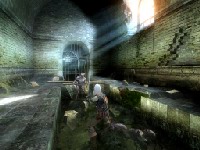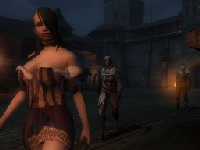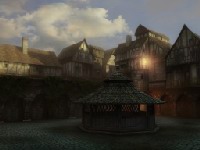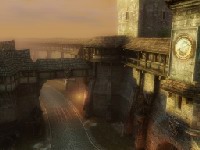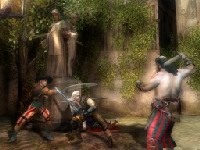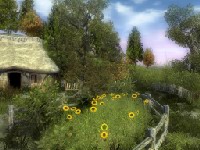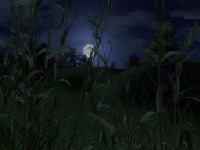|
The Witcher - An Interview with CD Projekt
Brian 'Dhruin' Turner, 2005-08-26 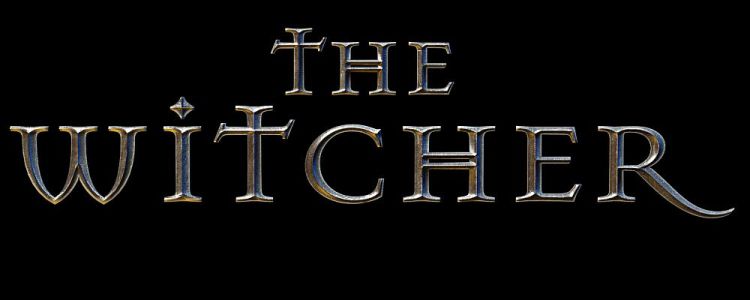
At a glance, CD Projekt's The Witcher might look like another action-RPG with pretty graphics and a marketable lead character but underneath that exterior lies a game that offers more freedom than many so-called "hardcore" RPGs, as we found out in our preview. We still had some burning questions, so we sent a batch of questions off that came back with some fascinating answers.
RPGDot: Please introduce yourself and tell us a little about CD Projekt.
CD Projekt: We usually answer questions as a team so I won't introduce myself personally. I'll just write a few words about CD Projekt. Our company was established over 11 years ago now so we've got quite a long history and although we're not well-known for producing games we're not newcomers to this industry either. We've seen a lot, we've done a lot and we've participated in many successes as well as failures. We gained all this experience as a game publisher in Poland, the Czech Republic and Slovakia. I think that our knowledge and experience are great advantages in developing games as we've seen a lot of mistakes made by developers and we know what we need to avoid. We've seen, we've played and we've observed the reactions of players after the premieres of practically all of the big RPGs starting from the time of Fallout and Baldur's Gate, which has given us a pretty good "theoretical" background in creating our own project.
The fact that we've been around for so long also has another completely different, but also very important meaning, in that we are very experienced from a business and organisational perspective too and what's most important is that we are completely financially independent. Our financial independence was the main reason why we didn't start designing games earlier. We realized that we could only do that when the company's profits were able to ensure independent financing of a big project without any problems. We didn't want to wait too long for that but finally the time has come and because of that The Witcher has come into being.
This independence allows us to feel very comfortable about our work. First of all we can create a game, which completely corresponds, to our own principles and secondly it allows us to feel comfortable when negotiating publishing contracts without any of the financial pressure, which often leads developers to sign contracts, which are not entirely suitable for them.
RPGDot: Why did you decide to expand beyond publishing into game development itself and why did you choose this project for your first game?
CD Projekt: We had already made the decision to start developing our own game 11 years ago :) because right from the very beginning we've been dreaming of developing computer games. However, we always try to make sure that the things that we take on are done well and we were waiting for the right time when we felt we would be able to do things on the right level. We expanded our publishing activities into more countries and we increased our market share and profits. At a certain moment we were ready to take that decision. Several people from the management team of CD Projekt stood down from their activities as part of the current company and started to get together and create a team.
Of course not everything went to plan, as can be seen from the story told here. Firstly, at the beginning we only wanted to make a port from PS to PC and this was supposed to be Baldur's Gate: Dark Alliance (BG:DA). We wanted to start with a simple project, where it was possible that many elements were already ready. However, the BG:DA project became very complicated. After six months of initial plans and receiving the source code and dev kit, exactly one day before the contract was signed it turned out that Interplay's situation was getting worse very quickly. We had several honest conversations in which we were loyally warned that we could take on the project but that it was not known if it would actually happen or not. In the case of BG:DA it was not only about the financing, which as a local distributor we could have compensated for from sales in Poland, but it was also about the potential legal problems connected with the involvement of other parties than just Interplay. Finally, it was with a heavy heart that we decided not to begin work on the project.
However, the idea of developing our own game and the early beginnings of a team were still there. We decided to work on developing our own game of this type and we knew straight away that the best idea would be to base it on Sapkowski's work, of which we are all big fans. It's just the perfect material for a computer game. We would never have been able to think up such a developed, colourful and interesting world and main character ourselves. So we very quickly signed a suitable contract, which also only went ahead after a few twists and turns, since the author had already signed a contract with another company which had in fact decided to abandon the project after their first attempt. What was worse, however, was that this contract was signed in the early days and in a bit of a rush and both parties forgot to include a clause on what would happen if work on the project was abandoned! So theoretically the other company still had the rights! Fortunately, we were able to sort that out and then we were able to start work.
The first year or two was spent writing the script and creating the initial game prototypes based on our own technology - so in the dark depths of the internet it's still possible to find some of the screens from that version. A very small team of 4-5 people was involved at that point. We really got to work on the project only after we got the licence to use the Aurora in 2003. Then that team grew to around a dozen people and now there are over 40 people involved.
RPGDot: When we first heard about The Witcher, one of the prominent features was the use of BioWare's Aurora engine. You have completely replaced the renderer and presumably the RPG mechanics are quite different to D&D - how have you used Aurora? Is there a danger some gamers will make assumptions about The Witcher's gameplay based on Neverwinter Nights?
CD Projekt: Frankly speaking, we were amazingly ambitious. Now, after it's all done, I'm not so sure if we would have made the same decision again. It took two years of intensive work by programmers - and there was quite a large team of them - to bring about all the changes that we wanted to tackle. Fortunately, that's all behind us and all the main modifications are finished now.
Of course all those changes are really going to pay off now. Graphically the game is equal to the best productions currently available and the new mechanics perfectly match the character of the game in which the dynamic clashes and combat are a very important element.
The actual choice of the Aurora engine was mainly connected to the fact that we needed an engine that was well-adapted to RPG games. We tested many engines but none of them offered such an effective solution for what we needed. Finally, we realised that it would be simpler just to change the renderer rather than create so many of the tools and architecture from scratch that are necessary to create an RPG game. It is also important that we already knew BioWare and had had a positive experience with them.
As far as gamers associating The Witcher with NWN is concerned; there is obviously the danger of that. However, I don't think it's such a big threat. We see it more as a possibility. I think that many fans of NWN will want to see The Witcher to find out what we've been able to do on the basis of NWN, even though it's a very different game. Of course there is a certain group of people who do not like NWN and they could also transfer that dislike to The Witcher. Our role will definitely depend on communicating in detail the differences between these games so that everyone will know what to expect.
RPGDot: We've seen the city of Vyzime in screenshots - what are some of the other locales players will encounter?
CD Projekt: First of all the screenshots which you can check out on the net only show a very small fragment of Vyzime with its walls and the causeway linking the new town with the old town fortifications. Only in the game itself will the player be able to see the hugeness and the diversity of the capital: from the squalid slums of the beggars through the merchant's quarter and right to the aristocratic palaces. In addition, in the town there are also sewers full of monsters and other underground locations with their own secrets. That's all I'm going to give away about what can be found in Vyzime itself. As for other towns there will be a second one in the game; the smaller but fortified town of Maribor.
However, most locations in the game are not in towns but fields, woods, marshes and of course, underground. The game begins in the ruined witcher fortress of Kaer Morhen, which is surrounded by imposing snow-capped mountain peaks. Travelling around the city of Vyzime there will be picturesque lakes, murky marshes, deserted towns and vast plains. Around Maribor there will be thick forests, forested rocks as well as villages of non-humans hidden in the woods protecting themselves from persecution. And there are also the caves, catacombs, sewers and many other underground locations.
RPGDot: Can you give our readers a sense of the size of the world? Is the gameworld continuous or a series of individual maps? How do players travel from location to location and how much freedom do they have in exploring in the gameworld?
CD Projekt: As for the size of the gameworld I think the answer to the previous question gives you an idea of that. In general we don't want to lie to the player by giving him square miles of empty, boring terrain - in our game we make use of every metre in order to show or say something interesting. That's why if we were to measure the actual terrain in metres then we wouldn't come out with a very impressive number. The gameworld will definitely be big enough to spend several dozen hours having a great time in it without coming across any false borders within that time. That is our main aim.
The map of the gameworld is made up of three main areas, which are separate from each other, but it is possible to travel between them with the help of our faithful horse. When in the location we then have to settle for travelling on foot or any other locally available form of transport - for example by raft or by boat on a lake. It is possible to travel between these three main locations at any time.
Each of the three locations is made up of a series of individual maps, which move smoothly from one to the other creating a cohesive and logical area. It is possible to travel between areas simply by walking there or after discovering a given fragment of the land we can also take a short cut there by using the plan of the location. What's most important is that there are no limits to where you can travel to, so new areas can be discovered just by walking around or by discovering them when completing a quest.
During all the work connected with the locations we have tried to avoid like the plague the use of obstacles and borders. That's why, as far as possible, the game is only restricted in a natural way. The way Sapkowski himself positions these locations has also really helped with this. Vyzime is located between two lakes and a marsh and Kaer Morhen, for example, is hidden among inaccessible mountains.
RPGDot: You mentioned in your E3 presentation that you've tried to maintain some architectural accuracy - to create realistic building layouts. Why did you decide this was important?
CD Projekt: That's because in our opinion reality and history are the best sources of inspiration. Firstly, by maintaining the reality of a given period we are creating a very visually coherent world. Secondly, even the most ingenious designers are not able to think up the ideas that architects have been using for hundreds of years, and what's more important they can't recreate things that were created by chance. Let's take for example the Leaning Tower of Pisa - do you think any level designer in his right mind would place something like that in the middle of a town he was planning? We can't forget that what was created by people hundreds of years ago was damn well thought out in order to fulfil its purpose. The town plans on which we based Vyzime (including Prague in the Middle Ages) were really clever and took into consideration much more and some other less obvious needs of the town and the authorities. It is not by accident that barracks, palaces, market places, temples, hospitals, rich peoples' houses and many other building are in the places that they are. This really helps in our work; if for example we have in the script a small event that is not connected to the story but makes the world more interesting for example something about the transport of bodies from the hospital then it is clear through which gate and where they should be carried and easy to plan so that they don't go past the rich peoples' houses or through the middle of the market place :)
In our opinion by basing our designs on authentic architecture we do not feel limited and we are simply enriching our imagination and increasing the believability of the world.
RPGDot: What sort of world will players encounter? There seems to be a theme of moral ambiguity - a sense that the world is a harsh place.
CD Projekt: Yes - the Witcher world is significantly different to the typical black and white carbon copies of Forgotten Realms. On the one hand we have everything that defines the fantasy genre - races that think differently, powerful magic, monsters from your worst nightmares, enchanted princesses etc. While on the other hand there is no clear division between Good and Evil, the powers of Light or Darkness or other well-worn formulas. The world in The Witcher is governed by the same rules and principles as reality. The strongest determine the law; people are motivated by their desire for fame, power and wealth, passion and love as well as, above all, the will to survive. In this world there are never any clear choices between what is good and what is bad. The writer himself sums this up best with one sentence: "there is only evil and lesser evil". And it is between these two that the player will choose.
RPGDot: Your E3 presentation also provided a glimpse of some of the choices players will face, such as making moral decisions or different approaches to quests. How much real impact will these decisions have on the gameplay? Are there multiple paths that run through the entire game?
CD Projekt: Again I'll have to refer back to the answer to the previous question. The world of the Witcher in the books was always full of difficult choices. The characters in the book are definitely not short of difficult choices and the author always leaves room for doubts about whether they've done the right thing or not. We're using the same idea - the player will have to make difficult choices more than once and will have to observe the consequences of these choices. As a result the course of these decisions will lead the player to one of three completely different endings - always with the question there of whether he acted in the best possible way. Was it necessary for him to sacrifice that friend for something that was already lost? Or maybe he chose the wrong battle and became a pawn in the hands of the powers of this world? There's only one answer - try and play the game again…...
As an entirely literal answer to the question I would say that yes there will be multiple paths through the game and they will all be very different….
RPGDot: One of the interesting design choices in The Witcher is the flow of time. In addition to simple things like NPCs reacting to the time of day, some events in the world continue independent of the player. What will this mean for the player?
CD Projekt: This will mean one thing - the world will not wait for the player while he saves it or destroys it. The gameworld in The Witcher has its own unrelenting consistency - the powers, which form it, do not even bow to the most powerful warriors since they are only individual units. The story, which is independent of the player's choices, takes place in its own mode - the hero can at most change the destiny of those close to him. It doesn't matter how powerful we are, we are still a pawn that can't save the world….
RPGDot: I believe you can attack and kill every NPC?
CD Projekt: I would express that a little differently - you can try to kill every NPC that you come across. There is no "mechanical" restriction that has been added by the designers. Of course, the consequences of these actions will be very easy to predict for any sensible player. Killing the head of a country, slaughtering the civil population or other drastic actions will be punished very harshly by the guards. Wizards in this world are strong enough to have a good chance of being able to defend themselves from us. The rest have to watch out since in our game no one is irreplaceable (including elves, or dwarves) and the danger of death does not only come from our hands. In reference to the question of moral choices - at some points the course of events will encourage the player to kill for his own interests and motivation; however the final decision will still be in the hands of the player. Sometimes there will be no way out - it will be necessary to choose the lesser evil.
Developing the game in this way requires a lot of extra work on our part but it also gets rid of one of the most frustrating restrictions that appear in many games: we have a sword and we can fight and we'd really like to get rid of someone but we can't even try to attack him…..
RPGDot: Staying true to Sapkowki's vision imposes restrictions on the player's character - Witcher's are male sword specialists with some limited magic, for example. Can you outline the character development system? Will players feel their character is unique?
CD Projekt: The strength of the Witcher gameworld is of course the Witchers - a completely unique and original idea for a fantasy character, and we don't intend to change that. And I'd like to go back to the theory that creativity comes from restrictions. Since we can't change the vision of the writer we have to find another way (apart from race, sex, class, etc.) to develop the character in the game - we discovered that we could add completely new, developed and attractive mechanics to the character that are both simple and intuitive. In the game there will be more than 200 different special Witcher abilities divided into 15 groups of development. It is for the player to decide how he will make his own character special and in what style of fighting he will be a master and how his magical powers will work etc. Despite this freedom there is no fear that the character will stop being the hero that Sapkowski intended - each of the abilities available is completely unique and only available to the Witcher. What's important is that the character created by the player can, as a result of the game, develop in a direction in which Geralt from the books could never do. He could never for example become a racist persecuting elves and helping to hunt them down! In the game the player has complete freedom to make decisions…
RPGDot: Given that Witchers are sword specialists, how much variation will players have in weapons?
CD Projekt: Since we do not want to build any unnatural restrictions or false regulations the hero will be able to use any weapon he finds and wants to use. This does not change the fact that fighting with a sword will be most effective - only then will it be possible to use Witcher-style combat with steel and silver swords. The existence of different weapons is not the only consequence of this freedom of choice and the reality of the world. Although they are generally less effective the other weapons will also have unique characteristics and sometimes will be very powerful or simply useful in specific situations. For example the butcher's knife, which is significantly weaker than the sword, will have the characteristic that it won't destroy certain internal organs of monsters that are very important sources of ingredients for elixirs.
RPGDot: The Witcher is an action-RPG so it's natural that combat will play a key role. Can you give our readers a feel for the balance between combat and other elements such as dialogue or exploration? Do any of the quests have non-combat solutions?
CD Projekt: To summarize the whole idea behind The Witcher - we want to combine an action RPG with an absorbing and remarkable story. Both of those factors are equally important for us and even if combat takes up more time than gaming it is the story that is the fundamental content of the game. As far as the quests are concerned - it will be possible to complete most of them in different ways, including of course those quests that have non-combat solutions. A good example may be a quest in which the Witcher has to help smuggle a consignment of weapons into a closed town during the night. Without going into detail, so as not to spoil the whole story, I can only say that finding solutions involves brutal use of force as well as cunning and different peaceful methods of beating the guards, including bribery, hiring out prostitutes etc. Furthermore, some possibilities will only be available through acquiring an appropriate reputation earlier on.
RPGDot: What can you tell our readers about the Alchemy system?
CD Projekt: In principle the system is very simple - the player has to obtain a "base" for an elixir (in our game this is alcohol of different strengths and quality), then ingredients (mainly found inside monsters' bodies) and then put everything together in the inventory. Of course that's where the more complicated part begins - there are many different combinations but much fewer useful elixirs. It is possible to experiment, which is simple but that costs the price of the ingredients and can lead to unexpected results - even more so because an unknown mixture must be tested by us before we find out what we have cooked up. It is possible to look for recipes in different places - but that kind of information is hard to find.
RPGDot: Is there anything you would like to add in closing?
CD Projekt: Above all we'd like to thank you for your comments! We would also like to invite you to visit our website at www.thewitcher.com, and we'd also like to invite you to The Witcher Week (24-31 August) during which we plan to publish a whole load of material, including new trailers.
We would also like to encourage you to comment on our actions. We try to observe what RPG fans are saying and, as far as possible, take that into account when creating the game.
Our thanks to the CD Projekt Red team for their time and assistance with both the preview and this interview - we certainly look forward to seeing the final product.
Links:
The Witcher
CD Projekt
|




